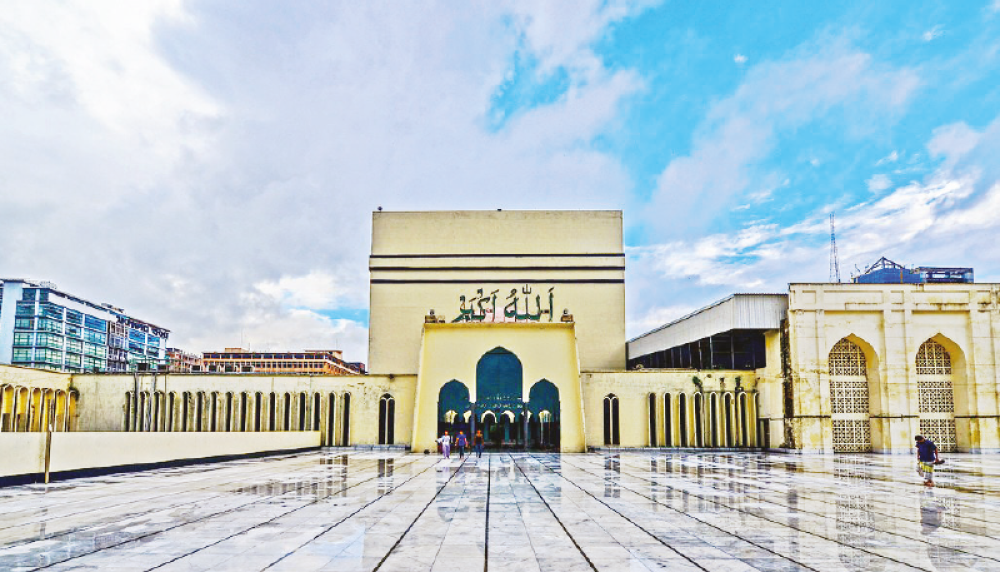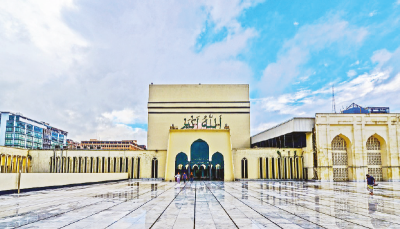

Baitul Mukarram Mosque in Dhaka, Bangladesh, hosts daily prayers five times a day, in accordance with Islamic tradition. Attending these prayers provides worshippers with an opportunity to observe their faith in a communal setting within the nation's national mosque. The mosque, with its modernist architecture inspired by the Kaaba in Mecca, offers a serene and spiritual environment for prayer. Worshippers gather in the vast prayer hall or in the expansive outdoor area. The daily prayers include Fajr (pre-dawn), Dhuhr (midday), Asr (afternoon), Maghrib (sunset), and Isha (evening). Individuals can join the congregational prayers, which are believed to bring greater reward than praying alone. Additionally, attending the prayers allows individuals to connect with the local Muslim community, partake in religious discussions, and envelop themselves in a peaceful atmosphere of devotion.
The weekly Friday Jumu'ah prayers held at Baitul Mukarram Mosque are of special significance in the Islamic faith, representing a time for communal worship and reflection. Every Friday, thousands of Muslims from Dhaka and surrounding areas gather at the mosque to listen to a sermon (khutbah) and participate in the traditional Jumu'ah congregational prayer. This event offers a unique opportunity for visitors and worshippers to experience the fervor and unity of the Muslim community. The Friday prayer is mandatory for adult Muslim men, while women and children are also welcome to participate. During the sermon, the Imam provides guidance on spiritual and practical matters of life, encouraging the congregation to live according to Islamic principles. The Mosque's vast prayer hall and courtyard become a hub of religious activity, fostering a strong sense of brotherhood among attendees.
The Baitul Mukarram Mosque is a focal point for celebrations during the two major Islamic festivals, Eid al-Fitr and Eid al-Adha. Eid al-Fitr marks the end of Ramadan, the holy month of fasting, while Eid al-Adha commemorates the willingness of Prophet Ibrahim to sacrifice his son in obedience to God. On these days, Muslims from across the city don their best attire and come together to perform the Eid prayers in a ceremonial congregation. It is an extraordinary display of harmony and joy. The mosque accommodates an immense number of worshippers inside and in the adjoining grounds. The prayers are followed by the exchange of greetings and good wishes, often involving charity to the poor. It is a significant time of giving and community engagement. Visitors can appreciate the rich cultural traditions and religious importance of Eid in the context of the Bangladeshi Muslim community.
Observing Ramadan at the Baitul Mukarram Mosque includes participating in the iftar, the meal with which Muslims break their daily fast at sunset. Ramadan is a month-long period of fasting, reflection, and community. The iftar at Baitul Mukarram Mosque is a special occasion that brings together the faithful from all walks of life to share a meal that typically begins with the eating of dates and drinking water or milk, in adherence to the tradition of Prophet Muhammad. The iftar meal here may also include a variety of traditional Bangladeshi foods. Following the iftar, worshippers perform the Maghrib prayer and later engage in Taraweeh prayers, which are extra prayers specific to Ramadan. This is an enriching experience, offering a sense of unity and spiritual upliftment during the holy month.
Aside from the regular prayers and the two major Eid celebrations, Baitul Mukarram Mosque also observes various Islamic events and festivals throughout the year. These events include Mawlid al-Nabi, the birthday of Prophet Muhammad, and observances of significant dates in the Islamic calendar, such as the Night of Power (Laylat al-Qadr), believed to be the night when the first verses of the Quran were revealed to the Prophet. During such occasions, the mosque organizes special prayers, recitations, and religious discussions that highlight the significance and teachings of Islam. These celebrations are characterized by a spirit of devotion and are accompanied by communal meals, making them ideal for visitors interested in experiencing and understanding Islamic culture and religious practices in Bangladesh.
Baitul Mukarram Mosque frequently hosts religious scholars and experts who deliver lectures and sermons on various aspects of Islam. These events serve as a means for the local community to deepen their understanding of their faith and apply its lessons to their daily lives. Topics often cover religious doctrine, moral conduct, contemporary issues facing Muslims, and the history of Islam. Visitors are welcome to attend these thought-provoking sessions, which can provide insight into the role of religion in Bangladesh's societal fabric. Attending these lectures can be especially enlightening for those interested in the intellectual traditions of Islam and the way these principles are taught and practiced in Bangladesh.
The Baitul Mukarram Mosque holds classes and study circles focused on the Quran, the holy book of Islam. These classes cater to a range of participants, from children learning to recite the Quran to adults seeking a deeper understanding of its teachings. The sessions are led by qualified teachers who aid students in perfecting their recitation, comprehension, and memorization of the text. Such classes are instrumental for those wishing to connect with the scripture more profoundly or to learn the classical Arabic language in which it is written. For non-Muslim visitors or those with limited knowledge of Islam, attending these classes can offer a unique cultural and educational experience, providing valuable insights into the centrality of the Quran in Muslim faith and practice.
Baitul Mukarram Mosque serves as a center for community outreach and charitable activities. These programs aim to assist the underprivileged and vulnerable groups within Dhaka. Activities can include distribution of food and clothing, offering medical camps, or providing shelter for the homeless. During special times of the year such as Ramadan or before Eid festivals, these efforts are significantly ramped up. Participation in these programs is an excellent opportunity for visitors and worshippers alike to engage with the community, contribute to social welfare, and understand the social responsibilities emphasized in Islam. For those interested in volunteer work or observing social activism within a religious framework, joining these outreach initiatives can be a fulfilling experience.
Equipping the younger generation with knowledge about their faith is an important function of Baitul Mukarram Mosque. The mosque runs various religious education programs for children, including weekend and evening classes. These classes typically cover the basics of Islamic beliefs, prayer practices, moral values, and life lessons from the Quran and Hadith. The curriculum is designed to be engaging and age-appropriate, with the goal of nurturing a positive religious identity. Children also learn about the significance of their cultural heritage. For families visiting or residing in Dhaka, enrolling children in these classes can be a valuable way to ensure that they receive a well-rounded and authentic introduction to Islamic education in a supportive environment.
Promoting understanding and harmony between different religious communities is a crucial part of the work at Baitul Mukarram Mosque. The mosque occasionally organizes interfaith dialogues and panels that bring together leaders and followers of various faiths to discuss matters of mutual concern, share religious perspectives, and foster respect for each other's beliefs. These events often address common issues such as peacebuilding, social justice, and ethical living. Attending these dialogues can provide attendees with a broader perspective on the role of religion in modern society and the ways in which different faith communities can collaborate for the common good. It's an enlightening experience for anyone interested in comparative religion or community peacemaking efforts.
